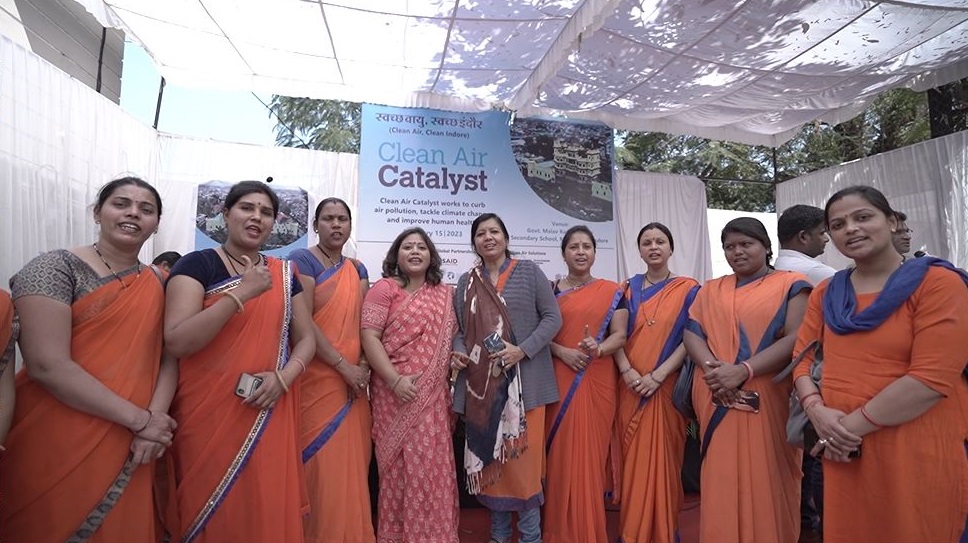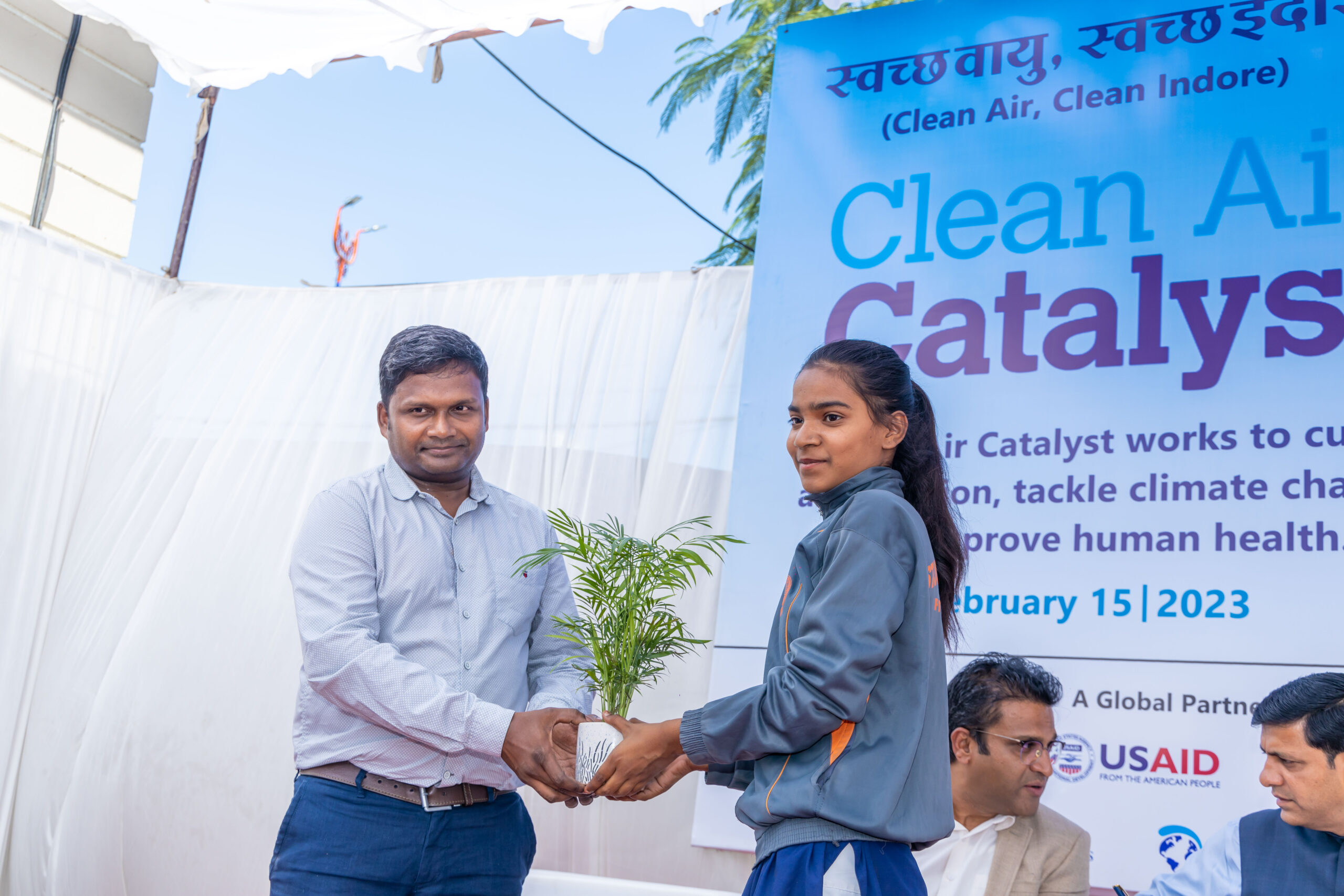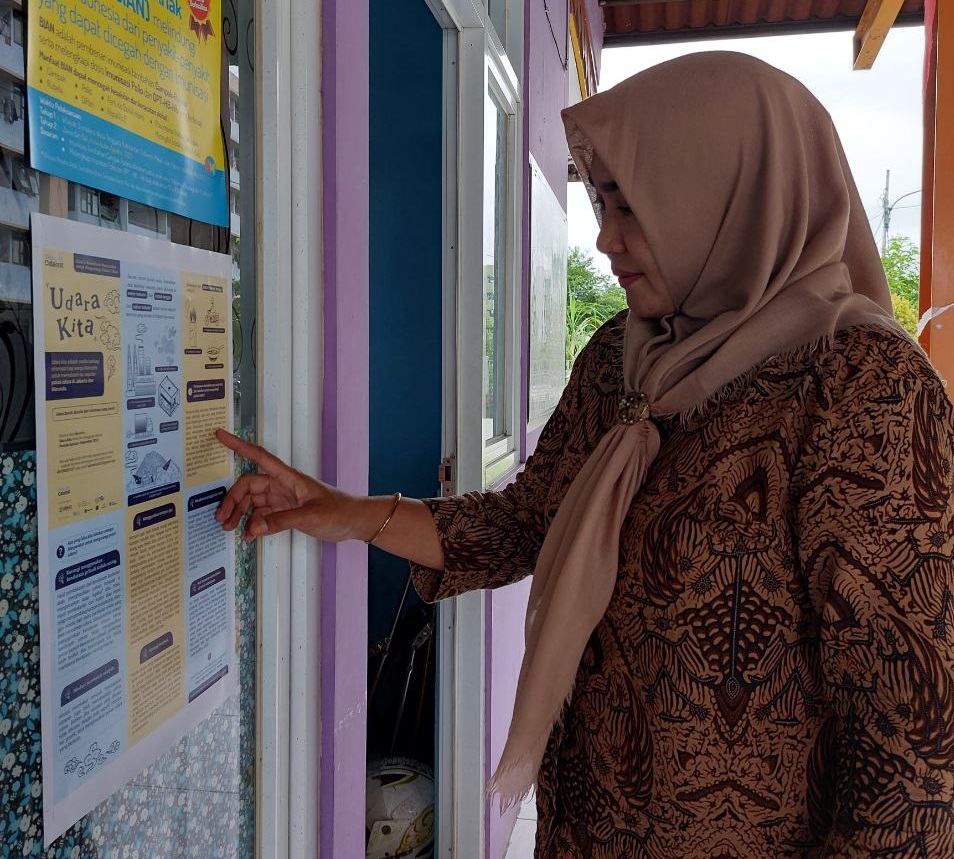
A key objective of the Clean Air Catalyst is to exchange knowledge, build trust and foster opportunities to elevate the voices of those most impacted by air pollution, particularly women and low-income communities. Funded by the U.S. Agency for International Development and co-led by World Resources Institute and Environmental Defense Fund, this global partnership seeks to build solutions for clean air that are equitable and sustainable by structuring data collection and air quality management around those most harmed by pollution.
A growing body of research demonstrates how women and men, in all their diversity of experiences and socioeconomic status, are exposed to different levels of air pollution and subsequently face different health impacts and consequences. This is particularly the case when it comes to women and children’s exposure to indoor air pollution from the use of cookstoves and other household fuels. Although the problem is less well-documented, women in low- and middle-income countries often suffer disproportionately from poor sanitation and waste burning and are more exposed than other demographic groups to toxic chemicals due to their occupations. These disparities in pollution exposure are compounded by poverty, other gender inequalities and discriminatory cultural norms. Lack of adequate housing, mobility and employment increase vulnerability to the health effects of pollution.
How Gender Impacts Exposure to Air Pollution

After more than two years of investigating the major sources of air pollution in Indore, India; Jakarta, Indonesia; and Nairobi, Kenya, and working with partners to understand the differentiated impacts air pollution has on men and women, boys and girls, and low-income marginalized communities, we now have a better picture of how different people move around the city and the risks to their health, environment and livelihoods.
For example, in Indore, a new analysis of time-based exposure indicates that women spend more time in unpaid domestic work-related activities compared to men. This was observed across all socio-economic status (SES) groups, making women more exposed to indoor air pollution. Men in the age group of 20-65 were found to spend more time than women in paid employment-related activities. Preliminary analysis in Indore also shows that lower SES women spend less time in commute-related activities as compared to higher SES women, indicating lack of affordability and spending capacity on travel needs among women of different income groups.
Our investigations across the three pilot cities also highlighted the serious gap in local, city-specific, gender-disaggregated data on the impacts of air pollution from specific sources, including variations by age, socio-economic status and occupation. These identified gaps showcase the need for more research on how to best help decision-makers understand and take action to address how exposure to air pollution is shaped by cultural norms, institutional practices and policies, gender roles and responsibilities, and time use.
As the pilot teams shift to developing and selecting solutions that get to the root causes of these challenges, this is an important time to deepen our engagement and pivot to how the Catalyst team can help empower women to become clean air catalysts. To achieve this goal, each pilot city now has a staff person or team responsible for implementing a gender strategy that includes reaching out to key stakeholders to ensure gender is mainstreamed throughout our pilot city activities.
What is “Empowering Women as Clean Air Catalysts?”
Empowering women as clean air catalysts means enabling and empowering them as leaders driving clean air action. To do this, Clean Air Catalyst is taking a gender-aware approach, which incorporates the awareness of gender-related challenges to the way it collects data and selects priority sources to ensure that women’s needs and priorities are considered in program design.
Implementing clean air solutions that empower women require the Catalyst to cultivate relationships and partnerships with a wide variety of stakeholders who can bring their expertise, experience and ideas. To this end, the gender pilot teams have begun to identify potential women champions across key stakeholder groups and are providing them with the opportunity to join Catalyst activities and help shape our solution strategies, including how the program will benefit women and reflect their needs.
For example, in Nairobi, Groots Kenya self-help groups, is supporting the implementation of Catalyst community engagement and co-leads the Community Engagement Committee of the Nairobi Air Quality Working Group (N-AIR), the key coordinating group of the pilot’s effort within the program. Along with N-AIR members, the Nairobi City County Government Gender Department and the National Gender and Equity Commission (NGEC), these groups help the Catalyst to mainstream gender-focused initiatives across science-based and engagement activities in addition to helping to cultivate women leaders. Recently, Groots Kenya and the NGEC organized a training session at a Catalyst workshop focused on key sources of local pollution. They highlighted key gender equality concepts and definitions and gave an overview of what gender equity mainstreaming means in practice. Panel discussions on gender roles and the gendered impacts of air pollution were also held.

In Jakarta, the gender team is setting the stage for empowerment and coalition building by reaching out to a wide variety of organizations that focus on the needs of specific stakeholders including women, youth, the urban poor, people with disabilities, the elderly, feminist organizations, national offices of international organizations, and government offices that support women and children. As many of these groups do not work directly on air pollution, the Catalyst is working to introduce the Catalyst initiative and identify opportunities for collaboration, including coordination with the local government’s Air Quality Forum set up by the Jakarta Environment Office. The pilot team plans to involve these stakeholders in our gender data collection and analysis efforts, including using interviews and focus group discussions to deepen the understanding around how air quality-related disparities manifest, what it means for their communities, how these impacts are linked with gendered disparities and the specific activities and policies we can incorporate into our air pollution solutions to address these community challenges.
Future Training and Events
In the coming year, pilot teams will continue to host Catalyst awareness-raising stakeholder trainings and workshops that highlight the gender differentiated impacts of air pollution and why a source awareness focus can open up new opportunities to reduce emissions and empower women.
The Catalyst is also launching a series of trainings and other learning opportunities that will expand stakeholder skills for advocacy and seeking effective engagement opportunities with policy and business officials and other key decision-makers to build the capacity of women clean air catalysts to lead coordinated action. In Jakarta for example, the pilot team is organizing Learning Circles in collaboration with key partners including Jakarta Feminist, a NGO dedicated to achieving gender equality in Jakarta, as well as with NAFAS, a low cost sensor organization that will a provide personal monitoring equipment to participants to help them better understand their pollution exposure.
Looking forward to the final two years of the project, we plan on hosting policy and sector-specific forums relevant to the identified priority pollution sources where women and community-based leaders can actively participate and advocate for implementation of solutions and empowerment opportunities that focus on gender-responsive air quality management practices.
Clean Air Catalyst is a global partnership supported by the U.S. Agency for International Development and led by World Resources Institute and Environmental Defense Fund, Inc. focused on building capacity for locally tailored solutions that curb air pollution, tackle climate change and improve human health. Catalyst partners include the Columbia Climate School Clean Air Toolbox for Cities, Climate and Clean Air Coalition, Internews, MAP-AQ, OpenAQ and Vital Strategies.
A version of this article originally appeared on CleanAirCatalyst.org.
Elizabeth Moses is Gender Equity Lead for Clean Air Catalyst and a Senior Environmental Rights and Justice Associate with the Environmental Democracy Practice at WRI.








